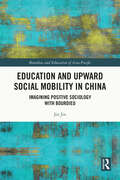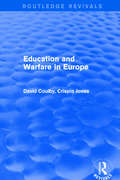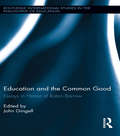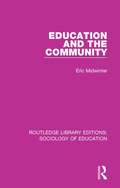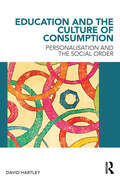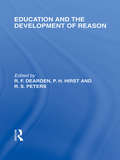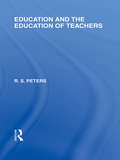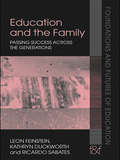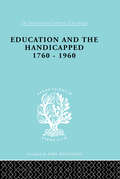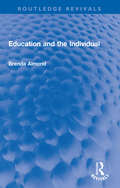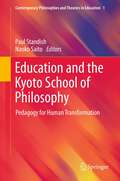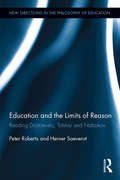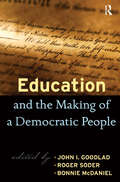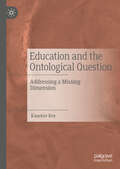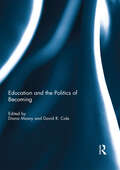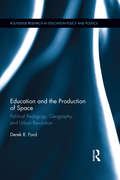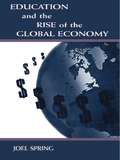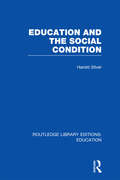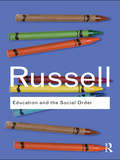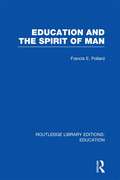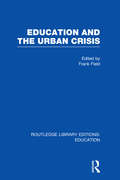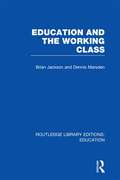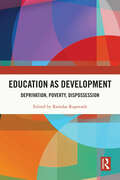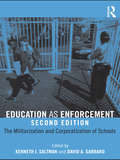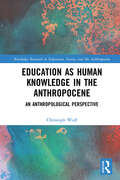- Table View
- List View
Education and Upward Social Mobility in China: Imagining Positive Sociology with Bourdieu (Bourdieu and Education of Asia Pacific)
by Jin JinBased on a three-year life story study of students from working-class backgrounds at four elite universities in China, this book offers a new way to understand and be inspired by Bourdieu.This book shows how Bourdieu’s ideas can be used to go beyond the analysis of domination and imagine a positive sociology of emancipation. Drawing on life stories of high-achieving students from working-class backgrounds, who experienced extreme social mobility in the education system and beyond, this book tracks multi-scalar and multi-layered class domination while documenting vivid experiences of living with and over structural disadvantages, forms of working-class ‘intelligence’, reflexive strategies, ‘failures’ of social reproduction, and moments of ‘mutations’. Through constant comparisons between life stories and Bourdieu, hopes and costs of upward social mobility, and possibilities and boundaries of transcendence, this book reflects on different conceptualisations of working-class reflexivity and suggests a vision of emancipation that can allow and encourage ways and values of ‘commoning’. This book highlights a relational perspective of understanding class and class struggles, which in turn introduces a relational perspective of (re)imagining reflexivity and transcendence.This book will appeal to students and scholars of Bourdieu, sociology of education, and education in China.
Education and Warfare in Europe (Routledge Revivals)
by David Coulby Crispin JonesThis title was first published in 2001: This book explores the ways in which European educational systems influence culture, identity, ethnicity and politics and may reinforce ethnic or national cleavages, violence and warfare.
Education and the Common Good: Essays in Honor of Robin Barrow (Routledge International Studies in the Philosophy of Education #31)
by John GingellRobin Barrow has been one of the leading philosophers of education for more than forty years. This book is a critical but appreciative examination of his work by some of the leading philosophers of education at work today, with responses from Professor Barrow. It will focus on his work on curriculum, the analytic tradition in philosophy, education and schooling, and his use of Greek philosophy to enrich current debates in the subject. This work will be of interest to all those who have been influenced by his contributions to educational and philosophical debate.
Education and the Community (Routledge Library Editions: Sociology of Education #37)
by Eric MidwinterFirst published in 1975, this book is the first to set out a blueprint for how schools can move from a ‘traditional’ to a ‘community’ base at local authority level. After presenting a historical analysis of the organisational development of the local education authority, it goes on to put forward a detailed proposal for an across-the-board, radically reformed education service at pre-school, school, post-school and college levels. Finally, it locates such a reformed ‘community education’ system in the context of community development at large.
Education and the Culture of Consumption: Personalisation and the Social Order
by David HartleyFor nearly 200 years the organisational form of the school has changed little. Bureaucracy has been its enduring form. The school has prepared the worker for the factory of mass production. It has created the 'mass consumer' to be content with accepting what is on offer, not what is wanted. However, a ‘revised’ educational code appears to be emerging. This code centres upon the concept of ‘personalisation’, which operates at two levels: first, as a new mode of public service delivery; and second, as a new ‘grammar’ for the school, with new flexibilities of structure and pedagogical process. Personalisation has its intellectual roots in marketing theory, not in educational theory and is the facilitator of 'education for consumption'. It allows for the 'market' to suffuse even more the fabric of education, albeit under the democratic-sounding call of freedom of choice. Education and the Culture of Consumption raises many questions about personalisation which policy-makers seem prone to avoid: Why, now, are we concerned about personalisation? What are its theoretical foundations? What are its pedagogical, curricular and organisational consequences? What are the consequences for social justification of personalisation? Does personalisation diminish the socialising function of the school, or does it simply mean that the only thing we share is that we have the right to personalised service? All this leads the author to consider an important question for education: does personalisation mark a new regulatory code for education, one which corresponds with both the new work-order of production and with the makeover-prone tendencies of consumers? The book will be of great interest to postgraduate students and academics studying in the fields of education policy and the social foundations of education, and will also be relevant to students studying public policy, especially health care and social care, and public management.
Education and the Development of Reason (International Library of the Philosophy of Education Volume 8)
by R. F. DeardenThis volume critically and constructively discusses philosophical questions which have particular bearing on the formulation of educational aims. The book is divided into three major parts: the first deals with the nature of education, and discusses the various general aims, such as 'mental health', 'socialization' and 'creativity' which have been thought to characterize it; the second section is concerned with the nature of reason and its relationship to feeling, will and action; finally the development of different aspects of reason in an educational context is considered.
Education and the Education of Teachers (International Library of the Philosophy of Education volume 18)
by R.S. PetersThis collection of important and significant papers examines a wide range of issues. One of the author's main concerns is to clarify the meaning of 'education' and 'quality in education' - a phrase often used in public debate but seldom scrutinized. Long-standing ambiguities latent in the concept of 'liberal education' are also exposed, and Herbert Spencer's question 'What knowledge is of most worth?', vital in the light of the recent vast development of knowledge, is considered. The first section of the collection clarifies different aspects of the concept of education and to reflect upon the difficulties and dilemmas facing teachers who strive to educate their pupils as distinct from just preparing them for examinations. This section concludes with a constructive re-examination of Plato's conception of education with a view to seeing what is acceptable in it instead of just concentrating on what is manifestly unacceptable. The second section is concerned with the role of edcuational theory in the education of teachers.
Education and the Family: Passing Success Across the Generations (Foundations and Futures of Education)
by Leon Feinstein Kathryn Duckworth Ricardo SabatesWhy it is that success, deprivation or disadvantage are so often passed down intergenerationally? What part does education play? The educational achievement of parents is often reflected in that of their children and there are many underlying causes for such a relationship. Education and the Family argues that government policy has an important role to play in addressing this inequality even though many of the causes lie within the home. Although each child should be supported to achieve his or her objectives, differences in the willingness or capabilities of families to take advantage of educational opportunities exacerbate social class differences and limit actual equality of opportunity for many. Understanding the causes of this transmission is key to tackling both social class inequality and to expanding the skill base of the economy. By providing an overview of academic and policy thinking in relation to the role of the family, this book explores the educational success of children. It focuses on the education of the parents but also considers how the family - compared to wider, external influences such as schools - is a driver of differences in educational outcomes. It concludes with a consideration of what policy-makers are attempting to do about this key issue and why, and how this will impact on schools and teachers. This book will interest researchers and academics in education and social policy, as well as teachers and other education and social policy practitioners.
Education and the Handicapped 1760 - 1960 (International Library of Sociology #Vol. 221)
by D.G. PritchardFirst published in 1998. Routledge is an imprint of Taylor & Francis, an informa company.
Education and the Individual (Routledge Revivals)
by Brenda AlmondFirst published in 1981, Education and the Individual presents a reasoned case for maintaining the maximum freedom of choice in education in those areas where the interests of the individual and the state conflict. The book argues that ultimately the freedom to opt out of the education system altogether must be protected, as well as the freedom to choose a religious education in a secular state, or a secular education in a religious state, and freedom from political indoctrination. It analyses what is required of education in a liberal society, and explores its implications for the wider international context of human rights. It also promotes the basic rights of freedom of choice in education and, wherever conflict is inevitable, it argues for the issue to be settled in favour of the individual, rather than the state. Education and the Individual will appeal to those with an interest in the history of education, the philosophy of education, and the relationship between education and politics.
Education and the Kyoto School of Philosophy
by Naoko Saito Paul StandishThe work of the Kyoto School represents one of the few streams of philosophy that originate in Japan. Following the cultural renaissance of the Meiji Restoration after Japan's period of closure to the outside world (1600-1868), this distinctly Japanese thought found expression especially in the work of Kitaro Nishida, Keiji Nishitani and Hajime Tanabe. Above all this is a philosophy of experience, of human becoming, and of transformation. In pursuit of these themes it brings an inheritance of Western philosophy that encompasses William James, Hume, Kant and Husserl, as well as the psychology of Wilhelm Wundt, into conjunction with Eastern thought and practice. Yet the legacy and continuing reception of the Kyoto School have not been easy, in part because of the coincidence of its prominence with the rise of Japanese fascism. In light of this, then, the School's ongoing relationship to the thought of Heidegger has an added salience. And yet this remains a rich philosophical line of thought with remarkable salience for educational practice. The present collection focuses on the Kyoto School in three unique ways. First, it concentrates on the School's distinctive account of human becoming. Second, it examines the way that, in the work of its principal exponents, diverse traditions of thought in philosophy and education are encountered and fused. Third, and with a broader canvas, it considers why the rich implications of the Kyoto School for for philosophy and education have not been more widely appreciated, and it seeks to remedy this. The first part of the book introduces the historical and philosophical background of the Kyoto School, illustrating its importance especially for aesthetic education, while the second part looks beyond this to explore the convergence of relevant streams of philosophy, East and West, ranging from the Noh play and Buddhist practices to American transcendentalism and post-structuralism.
Education and the Limits of Reason: Reading Dostoevsky, Tolstoy and Nabokov (New Directions in the Philosophy of Education)
by Peter Roberts Herner SaeverotIn recent decades, a growing body of educational scholarship has called into question deeply embedded assumptions about the nature, value and consequences of reason. Education and the Limits of Reason extends this critical conversation, arguing that in seeking to investigate the meaning and significance of reason in human lives, sources other than non-fiction educational or philosophical texts can be helpful. Drawing on the work of Dostoevsky, Tolstoy and Nabokov, the authors demonstrate that literature can allow us to see how reason is understood and expressed, contested and compromised – by distinctive individuals, under particular circumstances, in complex and varied relations with others. Novels, plays and short stories can take us into the workings of a rational or irrational mind and show how the inner world of cognitive activity is shaped by external events. Perhaps most importantly, literature can prompt us to ask searching questions of ourselves; it can unsettle and disturb, and in so doing can make an important contribution to our educational formation. An original and thought provoking work, Education and the Limits of Reason offers a fresh perspective on classic texts by Dostoevsky, Tolstoy and Nabokov, and encourages readers to reconsider conventional views of teaching and learning. This book will appeal to a wide range of academics, researchers and postgraduate students in the fields of education, literature and philosophy.
Education and the Making of a Democratic People
by Bonnie Mcdaniel John I. Goodlad Roger SoderUnfortunately, civic values such as equity and justice that constitute the moral grounding of American democracy are losing their place in public affairs. The promise of this democracy is inclusive: no one is to be left out. Yet many people are. Education and the Making of a Democratic People regards the challenge of inclusiveness as a fundamental and non-negotiable educational agenda. America's public schools are a main public forum in which people can learn to preserve and actively protect our democratic process. The value of our schools as a democratic forum extends beyond the classroom to parents and other members of local communities. By engaging in conversations and actions that support the democratic purpose of schools, local communities can ensure that the United States will become a healthy, robust democracy that represents all of its citizens.
Education and the Ontological Question: Addressing a Missing Dimension
by Kaustuv RoyThis book identifies and expands upon the link between ontology and education, exposing a lack of ontological inquiry as the vital missing element in the study and practice of modern education today. In this book, Roy aims to reintroduce ontological thinking and reasoning that grounds historical and modern educational understandings and practice. Beginning with a historical perspective, he then turns to examine the results of his scholarship into practical concerns of education such as language, dialogue, and curriculum: ultimately proposing a new way forward emphasizing a balance in the education effort between epistemic content and ontological disclosure.
Education and the Politics of Becoming
by Diana MasnyThis collection examines education in the light of a politics of becoming. It takes a non-hierarchical transdisciplinary approach, challenging the macropolitics of pre-established governmental and economic agendas for education. Drawing on the philosophy of Gilles Deleuze and Felix Guattari, the contributors consider questions such as how education might engage a politics of becoming, and how education and becoming function in a society of control. Since Deleuze and Guattari contend that a society is defined by its becomings, its transformations, this collection asks how education, itself a process in becoming, may contribute "collective creations" to a society in continual flux.The chapters bring theory and praxis together, deploying power, affect, cartography, space, relationality, assemblage and multiple literacies in order to experiment with music, art, language, teacher education, curriculum and policy studies. This collection is an innovative resource, creating an encounter with the macropolitics of education, and altering teaching, learning, evaluation and curriculum. This book was originally published as a special issue of Discourse: Studies in the Cultural Politics of Education.
Education and the Production of Space: Political Pedagogy, Geography, and Urban Revolution (Routledge Research in Education Policy and Politics)
by Derek R. FordEmerging from a radical pedagogical tradition, Education and the Production of Space deepens and extends Henri Lefebvre’s insights on revolutionary praxis by revealing the intimate relationship between education and the production of space. Synthesizing educational theory, Marxist theory, and critical geography, the book articulates a revolutionary political pedagogy, one that emerges as a break from within—and against—critical pedagogy. Ford investigates the role of space in the context of emerging social movements and urban rebellions, with a focus on the Baltimore Rebellion of 2015, and shows how processes of learning, studying, and teaching can help us produce space differently, in a manner aligned with our needs and desires.
Education and the Rise of the Global Economy (Sociocultural, Political, and Historical Studies in Education)
by Joel SpringJoel Spring investigates the role of educational policy in the evolving global economy, and the consequences of school systems around the world adapting to meet the needs of international corporations. The new global model for education addresses problems of technological change, the quick exchange of capital, and free markets; policies to resolve these problems include "lifelong learning," "learning societies," international and national accreditation of work skills; international and national standards and tests; school choice; multiculturalism; and economic nationalism. The distinctive contribution Spring makes is to offer an original interpretive framework for examining and understanding the interconnections among education, imperialism and colonialism, and the rise of the global economy. He offers a unique comparison of the educational policies of the World Bank, the United Nations, the European Union, and the Organization for Economic Development and Cooperation. Additionally, he provides and weaves together important historical and current information on education in the context of the expansion of international capitalism; much of this information, gathered from many diverse sources, is otherwise not easily available to readers of this book. In the concluding chapters of the volume, Spring presents a thoughtful analysis and a powerful argument emphasizing the importance of human rights education in a global economy. This volume is a sequel to Spring's earlier book, Education and the Rise of the Corporate State (1972), continuing the work he has been engaged in since the 1970s to describe and analyze the relationship between political, economic, and historical forces and educational policy.
Education and the Social Condition (Routledge Library Editions: Education)
by Harold SilverThis book reviews the educational experience of the 1960s and 1970s and to suggest ways of approaching major contemporary themes such as equality, accountability and standards. The author underlines a nineteenth and twentieth-century sociological tradition in analysing education and covers a range of educational themes including aspects of schooling and higher education, education as social policy, knowledge as power, and teaching and adolescence. He draws on the social history of many of the processes, concepts and debates. Parts of the book derive from research into the history and contemporary forms of these problems in the USA. The volume therefore illuminates important contemporary issues in education and society by using historical, sociological and comparative insights.
Education and the Social Order
by Bertrand RussellBertrand Russell was renowned for his provocative views on education. Considered an educational innovator, Russell attempted to create the perfect learning institution. Despite the failure of this practical vision, it did not stop him from continuing to strive towards inventing and arguing for a system of education free from repression. In Education and the Social Order, Russell dissects the motives behind educational theory and practice, and in doing so lays out original and controversial arguments for the reformation of the education of the individual.
Education and the Spirit of Man (Routledge Library Editions: Education #151)
by Francis PollardThis volume was the Swarthmore Lecture for 1932, one of an annual series of lectures delivered by and for members of the Society of Friends (Quakers). The lecture discusses the place of education and moral philosophy in the world of the early twentieth century, as well as the place of religious discipline in education.
Education and the Urban Crisis (Routledge Library Editions: Education)
by Frank FieldBased on two conferences, this volume explores trends during the 1960s and 1970s in inner city areas in the United Kingdom. It describes how the inner city is losing jobs and skilled workers and, as the population falls, the number of disadvantaged people and those claiming benefits is increasing. To what extent, the book asks, does the educational system contribute to or alleviate Britain’s urban crisis? In answering this question, the contributors examine the complex interrelationships between educational, economic and social problems, and point out that one of the major weaknesses of the present educational system in Britain is that it is in no way linked to the labour market. They suggest how schools could be better linked to local employment opportunities while at the same time offering more culturally varied educational opportunities. They also analyze Britain’s urban programme and show that it in no way matches up to what is required if poverty – which is seen as the root of the urban crisis – is to be eradicated.
Education and the Working Class (Routledge Library Editions: Education #179)
by Brian Jackson Dennis MarsdenWhen first published this book had a significant influence on the campaign for comprehensive schools and it spoke to generations of working-class students who were either deterred by the class barriers erected by selective schools and elite universities, or, having broken through them to gain university entry, found themselves at sea. The authors admit at the end of the book they have raised and failed to answer many questions, and in spite of the disappearance of the majority of grammar schools, many of those questions still remain unanswered.
Education as Development: Deprivation, Poverty, Dispossession
by Ramdas RupavathThis book is an in-depth analysis of the educational development of tribals in India. Education as Development: Deprivation, Poverty, Dispossession is a significant new addition for understanding educational and economic setbacks experienced by the marginalized in India. The volume:• Focuses on how the social, economic and education systems have evolved over time in India and identifies the scope of development in these areas;• Provides a rational structure for readers to understand how the Adivasi in India can be made to fit in the modern designed education system;• Highlights the problems of the marginalized – such as income inequality, education, health, housing, governance, civil society environment and infrastructure and others which hampers their overall growth. This book will be of great interest to students and researchers and policy makers in the fields of education, minority studies, indigenous studies, sociology of education, and South Asian studies.
Education as Enforcement: The Militarization and Corporatization of Schools
by Kenneth J. SaltmanThe first volume to focus on the intersections of militarization, corporations, and education, Education as Enforcement exposed the many ways schooling has become the means through which the expansion of global corporate power are enforced. Since publication of the first edition, these trends have increased to disturbing levels as a result of the extensive militarization of civil society, the implosion of the neoconservative movement, and the financial meltdown that radically called into question the basic assumptions undergirding neoliberal ideology. An understanding of the enforcement of these corporate economic imperatives remains imperative to a critical discussion of related militarized trends in schools, whether through accountability and standards, school security, or other discipline based reforms. Education as Enforcement elaborates upon the central arguments of the first edition and updates readers on how recent events have reinforced their continued original relevance. In addition to substantive updates to several original chapters, this second edition includes a new foreword by Henry Giroux, a new introduction, and four new chapters that reveal the most contemporary expressions of the militarization and corporatization of education. New topics covered in this collection include zero-tolerance, foreign and second language instruction in the post-9/11 context, the rise of single-sex classrooms, and the intersection of the militarization and corporatization of schools under the Obama administration.
Education as Human Knowledge in the Anthropocene: An Anthropological Perspective (Routledge Research in Education, Society and the Anthropocene)
by Christoph WulfThis book examines the concepts of the Anthropocene and globalisation in our society and the changes that these are bringing about in education and human learning. The book argues that there needs to be reflexive approach to issues that affect the fate of the planet and the future of humans, brought about by an education that looks to the future. Wulf argues that a change in education and socialization can only succeed based on an understanding of previous educational ideas, and considers the significance of Confucianism and spiritual education that emerged in the East. The book traces key educational ideas throughout history to show how education and human knowledge are closely linked, highlighting the need for us to pay careful attention to repetition, mimesis and the imagination in learning. It shows how a future-oriented education must engage with issues of peace and violence, global citizenship and sustainable development. This timely and compelling book will be of great interest to researchers, academics and students in the fields of philosophy of education, the history and anthropology of education, sustainability education and global citizenship education
